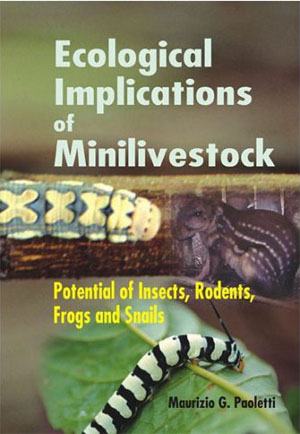 Now, I know I’m a pedant, and biased, but for me, micro has always been smaller than mini. Cars, skirts, whatever; micro is smaller than mini. It’s, like, a rule. So when our friends at the Global Facilitation Unit sent flyers for a book called “Ecological Implications of Minilivestock: Potential Of Insects, Rodents, Frogs And Snails”, I was puzzled. Insects, frogs and rodents aren’t mini, they’re distinctly micro. Capybara and beaver are probably mini-rodents, but the rest are micro too. The reason, I guess, is that the term “microlivestock” had already been snaffled, by “Microlivestock: Little-Known Small Animals With a Promising Economic Future”, a wonderful book that I had the pleasure of reading, and writing about, when it came out in 1991. Except that BEDIM, the Bureau for Exchange and Distribution of Information on Minilivestock, that is responsible for this book, was “created circa 1990”. My brain aches just thinking about it.
Now, I know I’m a pedant, and biased, but for me, micro has always been smaller than mini. Cars, skirts, whatever; micro is smaller than mini. It’s, like, a rule. So when our friends at the Global Facilitation Unit sent flyers for a book called “Ecological Implications of Minilivestock: Potential Of Insects, Rodents, Frogs And Snails”, I was puzzled. Insects, frogs and rodents aren’t mini, they’re distinctly micro. Capybara and beaver are probably mini-rodents, but the rest are micro too. The reason, I guess, is that the term “microlivestock” had already been snaffled, by “Microlivestock: Little-Known Small Animals With a Promising Economic Future”, a wonderful book that I had the pleasure of reading, and writing about, when it came out in 1991. Except that BEDIM, the Bureau for Exchange and Distribution of Information on Minilivestock, that is responsible for this book, was “created circa 1990”. My brain aches just thinking about it.
Anyway, what you call them is besides the point. Small animals make big sense. They eat things big animals don’t. They are much more productive per unit area, and probably per unit food too. They’re nutritious, especially for people who cannot afford to eat macrolivestock. Ecological Implications of Minilivestock is not brand, spanking new, but then neither is the idea of eating insects. Indeed, the editor sent the information to the GFU in response to a tiny article here about a Kenyan researcher who was promoting insects as human food. As a contribution to broadening the biodiversity of productions systems and diets, we are happy to give it some attention.